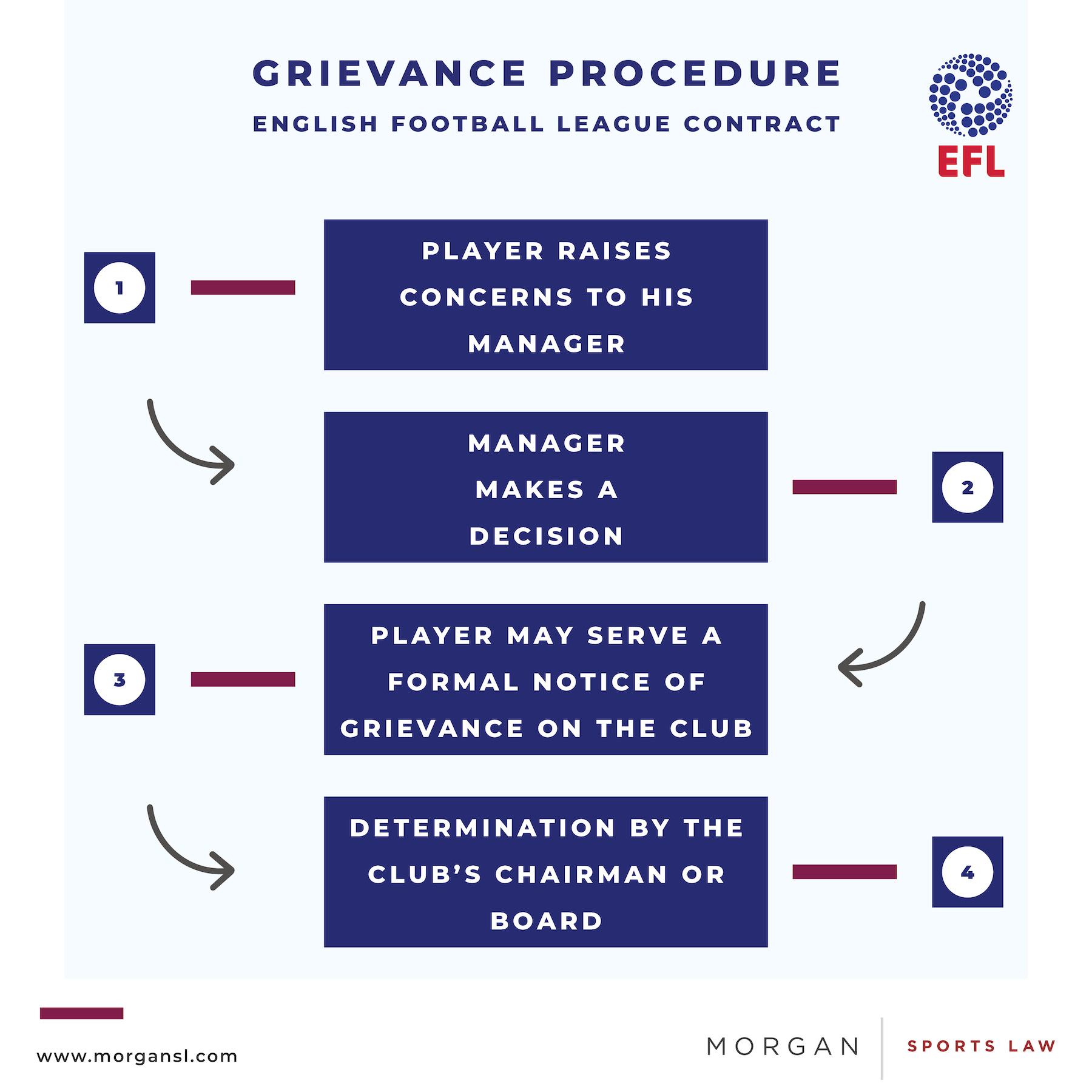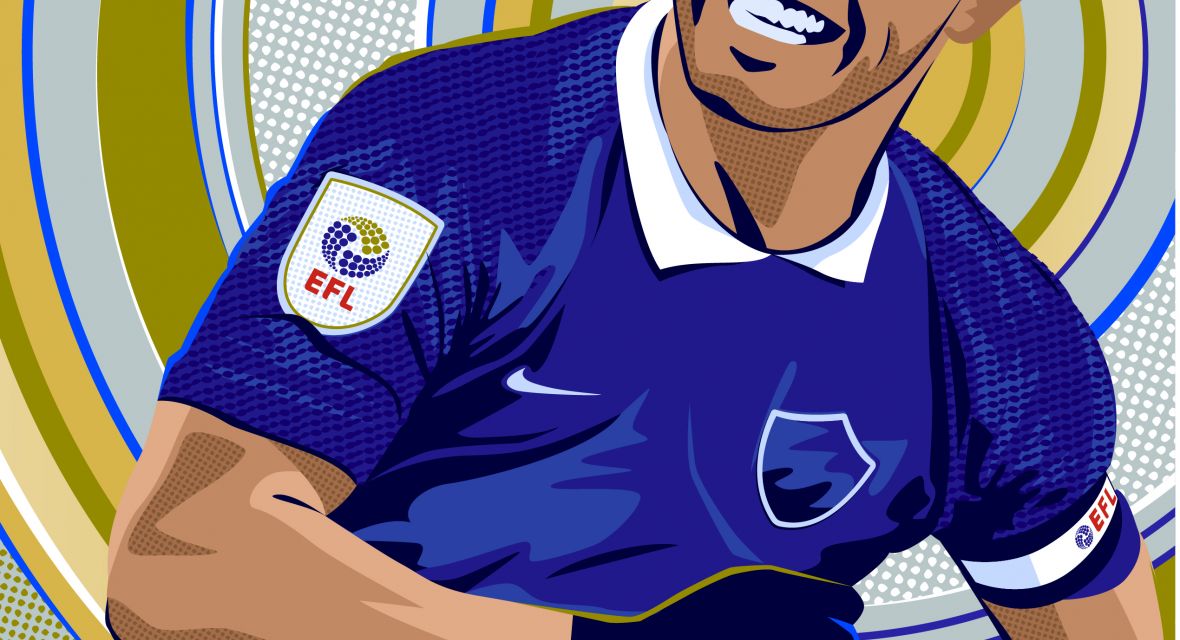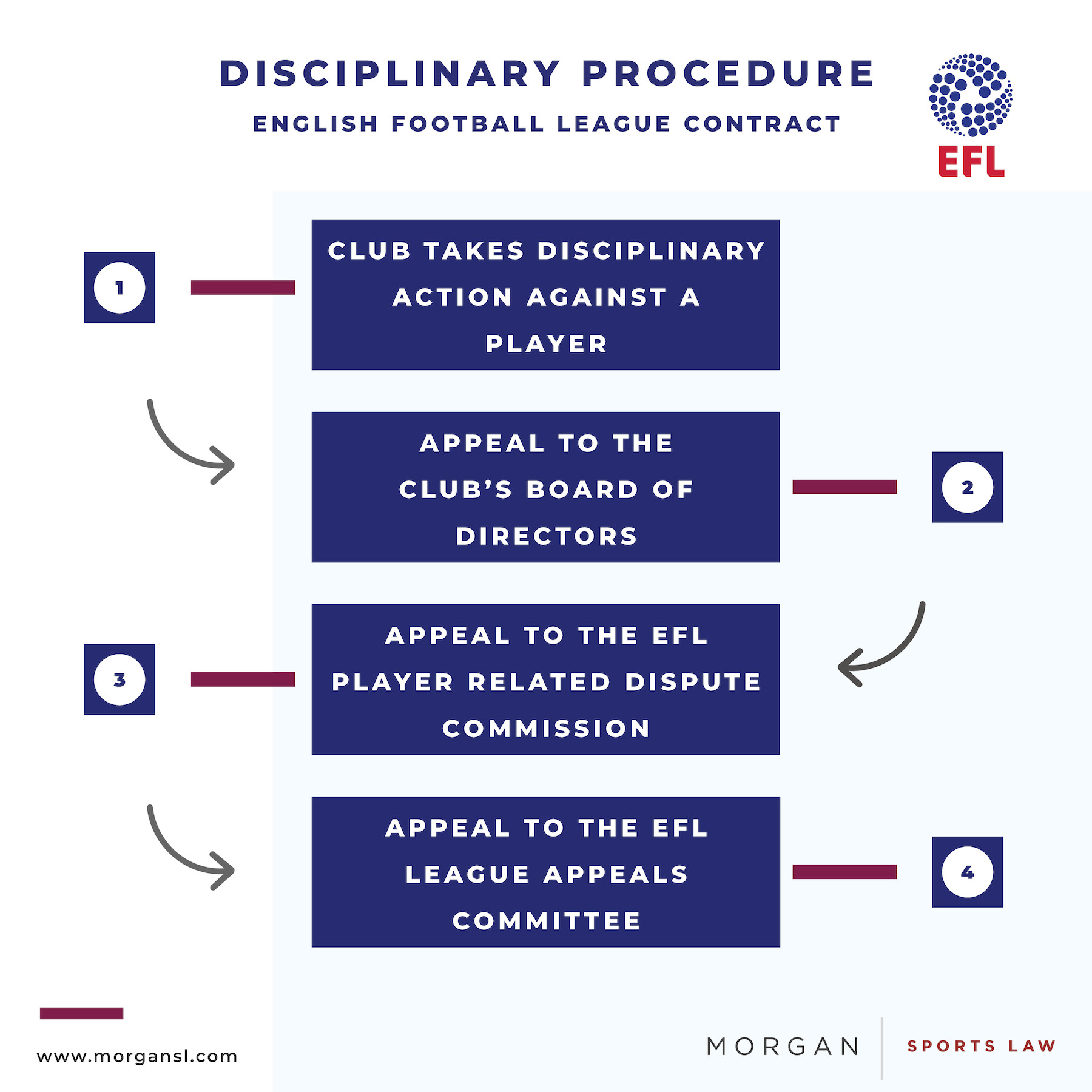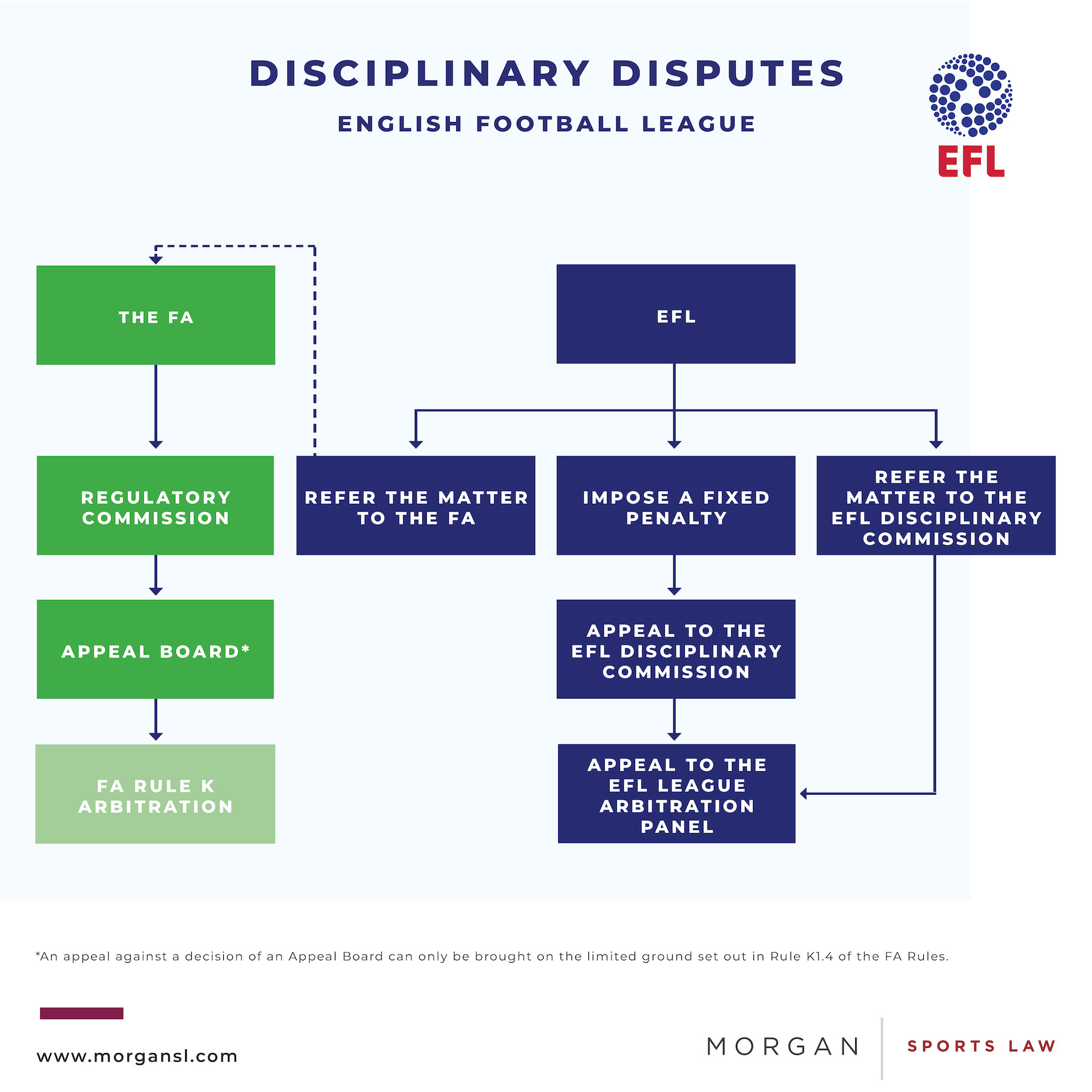Football Disputes: Guidance for English Football League Players
The relevant dispute resolution procedures can be found in the EFL Regulations, The FA Rules 2022/23 (the “FA Rules”) and the standard EFL Contract (the “EFL Contract”).
Players may become involved in various types of dispute, and each will be resolved in a different way. Broadly, there are three types of dispute: (i) employment-related disputes; (ii) disciplinary disputes; and (iii) “other” disputes. We consider each in turn.
Generally, football-related disputes are dealt with by way of arbitration or specialist tribunals and will rarely end up before national courts. The latter are therefore outside the scope of this article.
1. EMPLOYMENT-RELATED DISPUTES
Employment-related disputes are those which arise between players and their clubs (i.e., their employers). These might include, for example, disagreements over the club’s treatment of the player, payment, or termination.
a) Grievance and Disciplinary Procedures
If a player is unhappy with his club, it will often be advisable for players to first follow the Grievance Procedure set out in the EFL Contract, under which a player is entitled to have “any grievance in connection with his employment” heard.
The Grievance Procedure dictates that a dissatisfied player should, in the first instance, bring his concerns to the attention of his manager, informally, who will make enquiries and reach a decision. If the player is not satisfied with the outcome, he may serve a formal notice of grievance on the club secretary, and it will then be determined by the club’s Chairman or board.
Where the disagreement between a player and his club is relatively minor, the Grievance Procedure, and in particular its informal first stage, will often be the most effective and efficient method of resolving the dispute. It enables issues to be resolved swiftly and avoids the more adversarial procedures described below.

Conversely, a club may be able to take internal disciplinary action against a player under the Disciplinary Procedure set out in the EFL Contract, where they consider him to have breached the EFL Contract or any applicable rules.
A player can appeal any internal disciplinary sanction to the club’s board of directors and, if still dissatisfied, any sanction in excess of an oral warning can be appealed to the EFL’s Player Related Dispute Commission (the “PRDC”). Both clubs and players then have a final right of appeal to the EFL League Appeals Committee, whose decision is final.
b) Termination
Where the disagreement between a player and his club is more serious, or where the Grievance/ Disciplinary Procedure has not been effective, terminating the employment contract may become possible.
The EFL Contract gives a player the right to terminate his contract where the club has: (i) seriously or persistently breached the terms of the contract; or (ii) failed to pay the player the remuneration due under the contract.
It gives clubs a similar right to terminate where the player: (i) is found to have committed gross misconduct; (ii) fails to comply with a final warning under the club’s internal disciplinary procedure; or (iii) is found to have committed a criminal offence where the punishment consists of an immediate prison sentence of three months or more.
Both the club and the player have a right of appeal against such (purported) termination to the PRDC. There is also a final right of appeal to the EFL League Appeals Committee.
Importantly, the termination shall not become effective unless and until the appeal process concludes that the player/club was entitled to terminate the contract.
c) Other Employment-Related Disputes
For disputes falling outside the grievance, disciplinary and termination procedures, the EFL Contract provides that any dispute between the club and the player will be settled by way of arbitration, in accordance with the EFL Regulations.
Specifically, the EFL Regulations provide for such disputes to be referred for arbitration by the PRDC. The PRDC would therefore be the appropriate forum for disputes over unpaid salary, for example.
Such proceedings will be conducted in accordance with the Regulations 91 to 93 and Appendix 2 of the EFL Regulations. The PRDC has wide-ranging powers, including to grant declaratory or injunctive relief, specific performance and to order the payment of a sum of money. A decision of the PRDC may be appealed by either party to the EFL League Appeals Committee, whose decision shall be final.
Alternatively, the club and the player can, by mutual agreement, opt for their dispute to be referred to arbitration under Rule K of The FA Rules, which is broadly similar, though follows a more well-defined procedure.
2. DISCIPLINARY DISPUTES
An EFL player may be subject to disciplinary proceedings initiated by The FA or the EFL.
a) FA Disciplinary Proceedings
The FA is the principal body responsible for dealing with disciplinary matters in English football. Pursuant to Rule G3.1 of The FA Rules, facts which give rise to an alleged breach of both The FA Rules and the EFL Regulations will generally be dealt with by The FA under The FA Rules, unless The FA and the EFL agree that the latter should act.
The FA thus has authority to initiate disciplinary proceedings against players in respect of any misconduct, including breaches of the Laws of the Game and The FA’s rules and regulations.
At first instance, a disciplinary matter which falls under The FA’s jurisdiction will be decided by a Regulatory Commission which has the power to sanction a player with, for example, a reprimand, a warning, a fine, or a suspension from football activity for a specified period or number of matches.
Both players and The FA have the right to appeal a decision of a Regulatory Commission to an Appeal Board. In general, an Appeal Board’s decision is considered to be final and binding. However, in exceptionally rare cases, it may be possible to challenge the validity of an Appeal Board decision by way of FA Rule K arbitration.
b) EFL Disciplinary Proceedings
Given The FA’s broad jurisdiction, the EFL will only initiate disciplinary proceedings against a player where: (i) a set of facts gives rise to an alleged breach of the EFL Regulations but not The FA Rules; or (ii) there has been an alleged breach under both sets of rules and The FA and EFL agree that the EFL should handle the matter. It is therefore relatively rare for the EFL to do so.
The EFL may bring disciplinary proceedings for misconduct against a player by: (i) imposing a fixed penalty (i.e., a fine); (ii) referring the matter to the EFL Disciplinary Commission; or (iii) referring the matter to an FA Regulatory Commission (with the matter then subject to the relevant FA Rules, above).
A player can appeal against the imposition of a fixed penalty to the EFL Disciplinary Commission.
The EFL Disciplinary Commission has broad sanctioning powers, and the player thus has the right to a full hearing in respect of the misconduct complaint.
Both the EFL and the player may appeal a decision of the Disciplinary Commission to the EFL League Arbitration Panel, whose decision shall be final and binding.
3. OTHER DISPUTES
For disputes falling outside of the categories set out above, EFL players have two further options: the PRDC or FA Rule K Arbitration.
a) Player Related Dispute Commission
The EFL Regulations provide that any other types of disputes between players and clubs (for example, a dispute between a player and his former club over a mutual termination agreement) shall be referred to the PRDC, in accordance with the procedures described above.
As above, there is a final right of appeal against PRDC decisions to the EFL League Appeals Committee.
b) FA Rule K Arbitration
In the event that a dispute does not fall within one of the categories outlined above, such as a dispute between an EFL player and his agent, arbitration under Rule K of The FA Rules operates as a fall-back.
Rule K provides that save for those which have their own dispute resolution mechanism “any dispute or difference between any two or more Participants […] shall be referred to and finally resolved by arbitration under these Rules”.
The term “Participants” is defined broadly in The FA Rules and includes both clubs and players, as well as intermediaries, managers, competitions and all persons who are from time to time participating in any activity sanctioned either directly or indirectly by The FA. The scope of disputes covered by Rule K is thus extremely wide.
Like arbitrations conducted under EFL Regulations, Rule K arbitration tribunals have broad powers to resolve disputes, and their decisions are final and binding.
Authored by
Donna Bartley
Senior Associate
Ben Cisneros
Associate
Sam Kasoulis
Paralegal
Morgan Sports Law acts before football’s dispute resolution bodies, including in FA Rule K arbitrations. Please contact Donna Bartley with any enquiries.
Footnote
1. This article does not, and is not intended to, constitute legal advice, and should not be relied on or treated as such. EFL players facing issues similar in type to those set out in this article should seek specific legal advice.
2. Pursuant to Regulation 64.2 of the EFL Regulations, all contracts entered into between EFL clubs and players must be in the form of the EFL Contract (available at Form 14 of the Premier League Rules).
3. These procedures are broadly the same as those described in our Guidance for Premier League players, save with respect to appeals against disciplinary sanctions.
4. See clause 12 of the EFL Contract. The Grievance Procedure is set out at Part 2 of Schedule 1 of the EFL Contract.
5. See clause 9 of the EFL Contract. The Disciplinary Procedure is set out at Part 1 of Schedule 1 of the EFL Contract.
6. See EFL Regulation 64.10
7. See EFL Regulations 64.11 and 75
8. See clause 11 of the EFL Contract
9. Gross misconduct is defined, in clause 1.1 of the EFL Contract, as “serious or persistent conduct behaviour activity or omission by the Player involving one or more of the following: (a) theft or fraud; (b) deliberate and serious damage to the Club’s property; (c) use or possession of or trafficking in a Prohibited Substance; (d) incapacity through alcohol affecting the Player’s performance as a player; (e) breach of or failure to comply with of any of the terms of this contract.”
10. See clause 10 of the EFL Contract
11. See EFL Regulation 64.10
12. See EFL Regulations 64.11 and 75
13. See clause 17 of the EFL Contract
14. See EFL Regulation 74
15. See the ‘Guidance’ to EFL Regulation 54.1
16. See EFL Regulation 75
17. See clause 17 of the EFL Contract, and further below.
18. See The FA Rules at Rule E1
19. See Part A of The FA Disciplinary Regulations at paragraph 41
20. See The FA Rules at Rule K1.4. In 2014, then West Ham player Andy Carroll relied on the mechanism at Rule K.1.4. to challenge a Regulatory Commission’s decision to uphold his three match suspension for an incident involving Swansea player Chico Flores on the grounds that there had been an error of law and procedural unfairness during the first instance proceedings. Carroll’s challenge was ultimately unsuccessful.
21. See EFL Regulation 85.1
22. See EFL Regulation 88.2
23. See EFL Regulation 93.2
24. See EFL Regulation 92.4
25. See EFL Regulation 95
26. See EFL Regulation 74
27. See EFL Regulation 75
28. See Rule K1.1 of The FA Rules
29. See Rule A2 of The FA Rules
30. Subject to sections 67 and 68 of the Arbitration Act (see Rule K10.2 of The FA Rules).




